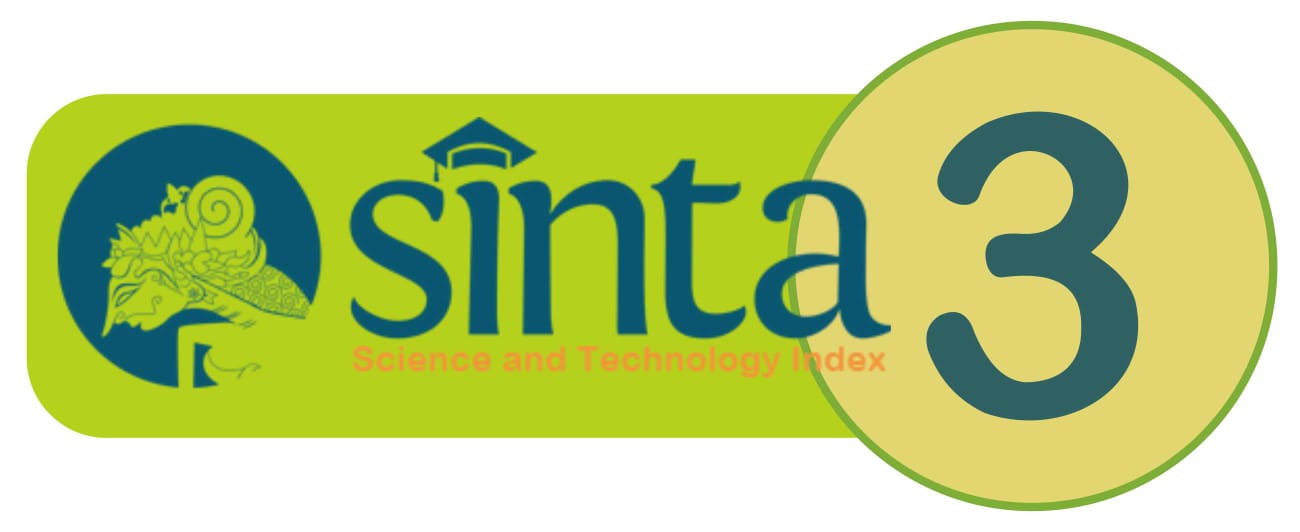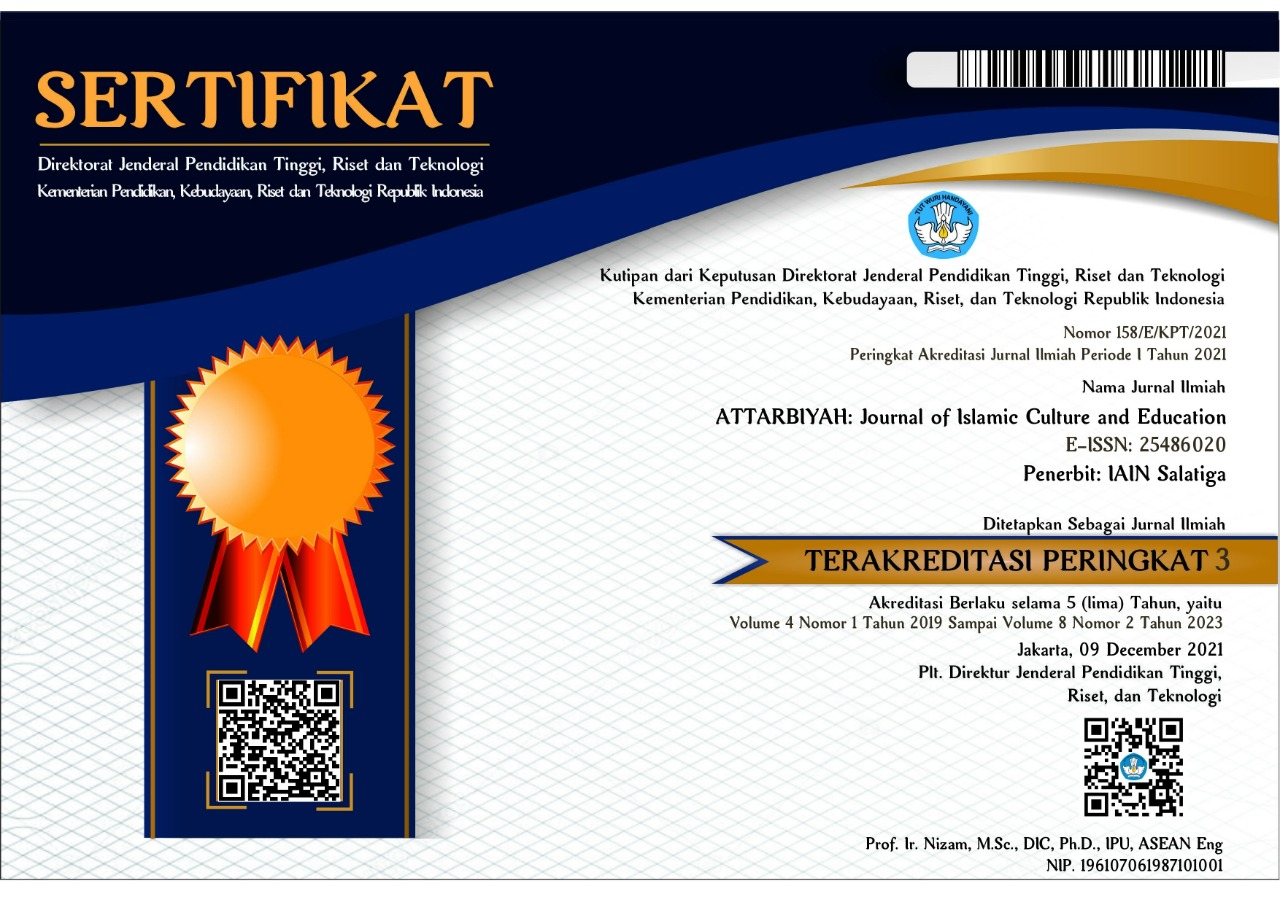Analysis of physical education in MAS Istiqomah Sri Gunting (perspective of Islamic education philosophy)
Abstract
This study aims to analyze physical education conducted at MAS Istiqomah Sri Gunting based on the perspective of Islamic education philosophy. This research is qualitative research with a phenomenological approach, and the tools used as data collectors are observations, interviews, document studies, and data analysis techniques through data collection steps, data reduction, data presentation, conclusion: Withdrawal/Verification, and validity testing. The results showed that the purpose of physical education at MAS Istiqomah Sri Gunting had not been based on the philosophy of Islamic education because it has not entirely followed health rules in dressing, following health rules about housing, maintaining hygiene, treating diseases, getting used to exercising and regulating eating and drinking patterns. The purpose of physical education is carried out based on the objectives of the educational curriculum used today as recommended by the government. This is reinforced by the absence of learning materials or actions that lead to the habits advocated through the Qur'an and hadith, as well as the opinions of scholars. As the hadith recommended, there were no student learning activities in archery, horse riding, or swimming. So it can be concluded, based on the analysis of the philosophy of Islamic education physical education conducted at MAS Istiqomah Sri Gunting, the objectives and implementation cannot be said to be sourced from the Quran, hadith, and the opinions of scholars as the source of Islamic educational philosophy.
Keywords
Full Text:
PDFReferences
Al-Abrasyi, M. A. (1975). Dasar-dasar pokok pendidikan Islam, terj. In Bustami A. Gani dan Djohar Bahry. Jakarta: Bulan Bintang. Bulan Bintang.
Al Rasyidin. (2008). Falsafah Pendidikan Islami: Membangun Kerangka Ontologi, Epistemologi dan Aksiologi Praktik Pendidikan Islami. Bandung: Citapustaka Media Perintis.
Asari, H. et.al. (2016). Filsafat Pendidikan Islami Menguak Nilai-nilai Pendidikan dalam Tradisi Islam. Medan: Perdana Publishing.
Budiman, S., & Suharto, A. W. B. (2021). Filsafat Ilmu Pendidikan Islam dalam Perspektif Pendidikan Jasmani. JISIP (Jurnal Ilmu Sosial dan Pendidikan), 5(3), 505–514. https://doi.org/10.36312/jisip.v5i3.2195.
Bunayar. (2022). Pendidikan Jasmani dan Olahraga. DIMAR: Jurnal Pendidikan Islam, 3(2), 252–275. https://doi.org/10.58577/
dimar.v3i2.59.
Creswell, J.W. & Creswell, J. D. (2018). Research Design Qualitative, Quantitative, and Mixed Methods Approaches. London: Sage Publication.
Azzahra, F. (2023). Pendidikan Islam dalam Perspektif Al-Ghazali. Indonesian Research Journal and Education. 3(1).
Hakiman, H., & Mustofa, K. K. (2022). Pendidikan Jasmani dalam Kitab At-Tahliyyah Wa AtTarghib dan Implikasinya dalam Pendidikan Islam. Al-Fikri: Jurnal Studi dan Penelitian Pendidikan Islam, 5(2), 153. https://doi.org/10.30659/jspi.5.2.153-176.
Kahar, S. (2018). Pendidikan Jasmani dan Pengaruhnya Terhadap Pendidikan Islam. Itqan. 9(2), 61–80.
Lubis, L. & Asry, W. (2020). Ilmu Pendidikan Islam. Medan: Perdana Publishing.
Miles, M. B., & Huberman, A. M. (1992). Qualitative Data Analysis: A Sourcebook of New Method. Terjemahan Tjetjep Rohendi Rohidi. Analisis Data Kualitatif: Buku Sumber tentang Metode-metode Baru. UI-PRESS.
Moleong, L. J. (2014). Metodologi Penelitian Kualitatif. Remaja Rosda Karya.
Mubarok, A. Z. (2019). Model pendekatan pendidikan karakter di pesantren terpadu. Ta'dibuna: Jurnal Pendidikan Islam, 8(1), 134. https://doi.org/10.32832/tadibuna.v8i1.1680.
Nasution, H. A. (2020). Pendidikan Karakter Perspektif Ibnu Sina. Al-Ikhtibar: Jurnal Ilmu Pendidikan, 7(1), 737–748. https://doi.org
/10.32505/ikhtibar.v7i1.612.
Nasution, N.H., Alwardah, S., Syawal, H., & Ok, A. H. (2023). Hakikat Tujuan Pendidikan Islam. Al-Ikram: Jurnal Pendidikan Guru Madrasah Ibtidaiyah. 1(1).
Nopel, P. (2022). Pendidikan jasmani dalam Al-Qur'an: Studi tafsir tematik. Edu Sportivo: Indonesian Journal of Physical Education, 3(2), 186–191. Https://doi.org/10.25299/es:ijope.2022.vol3(2).9131.
Rahman, F., & Wahyuningtyas, A. (2023). Konsep dan Tujuan Pendidikan Islam Menurut Ibnu Sina dalam Membangun Karakter Siswa di Era Digitalisasi. Journal on Education, 05(02), 2353–2368.
Rochim. (2017). Konsep Pendidikan Jasmani, Akal dan Hati dalam Perspektif Hamka. Jurnal Tarbiyatuna, 2(2), 59–83.
Rohman, F. (2021). Tujuan pendidikan Islam pada hadis-hadis populer dalam Shahihain. Ta'dibuna: Jurnal Pendidikan Islam, 10(3), 367. https://doi.org/10.32832/tadibuna.v10i3.5107.
Sundari, N., Warrahmah, M., & Nurkholiq, A. (2023). Tujuan Pendidikan Islam Dalam AlQur'an dan Hadist. Jurnal Multidisiplin Indonesia, 2(7). 1426-1434.
Suprayitno, S., & Mujahidin, E. (2020). Kurikulum Pendidikan Jasmani: Studi Analisis Kitab Tarbiyatul Aulad Fil Islam. Tawazun: Jurnal Pendidikan Islam. 13(1). 75.
Tafsir, A. (1992). Ilmu Pendidikan Dalam Perspektif. Bandung: PT. Remaja Rosda Karya.
Walidin, W. (2003). Konstelasi Pemikiran pedagogik Ibnu Khaldun Perspektif Pendidikan Modern. Lhokseumawe: Yayasan Nadiya.
Wardani, K., Soekardi., & Fakhruddin (2017). Kajian Pendidikan Jasmani Olahraga dan Kesehatan di Pondok Pesantren Askhabul Kahfi Kota Semarang. Journal of Physical Education and Sports, 6(1), 57–65
DOI: https://doi.org/10.18326/attarbiyah.v8i1.61-72
Refbacks
- There are currently no refbacks.

ATTARBIYAH: Journal of Islamic Culture and Education by http://attarbiyah.iainsalatiga.ac.id/ is licensed under a Creative Commons Attribution-ShareAlike 4.0 International License
----------------------------------------------------------
ATTARBIYAH : Journal of Islamic Culture and Education IAIN SALATIGA p-ISSN: 0215-9996, e-ISSN: 2548-6020




